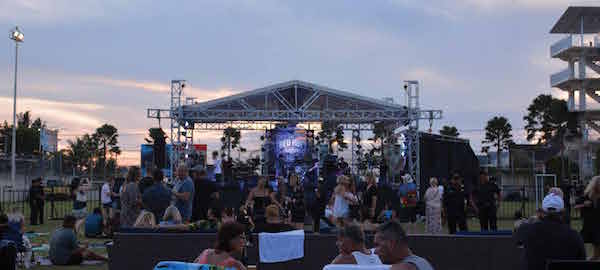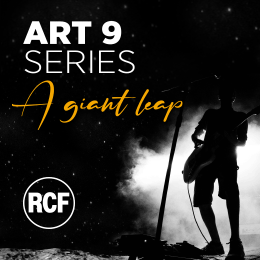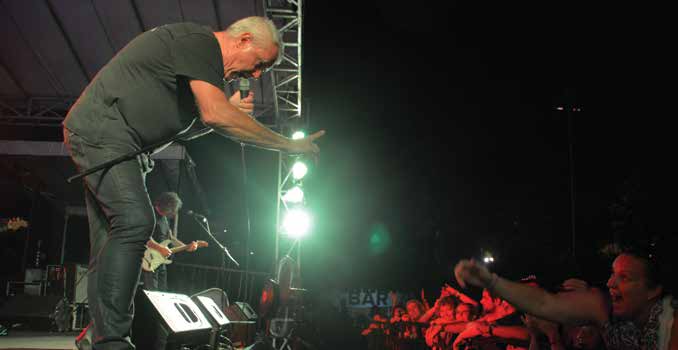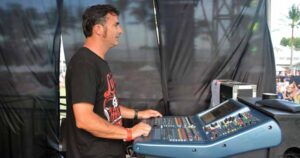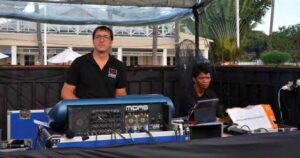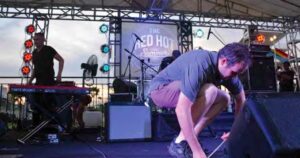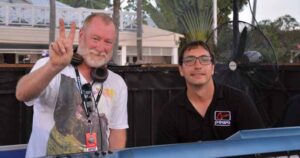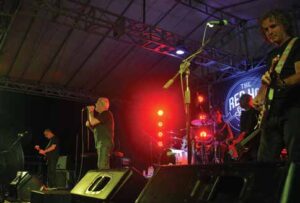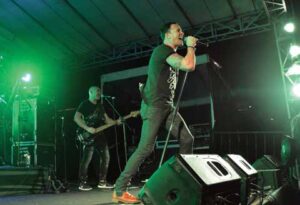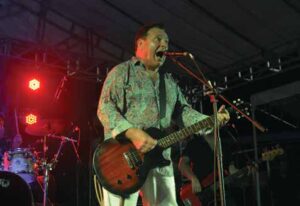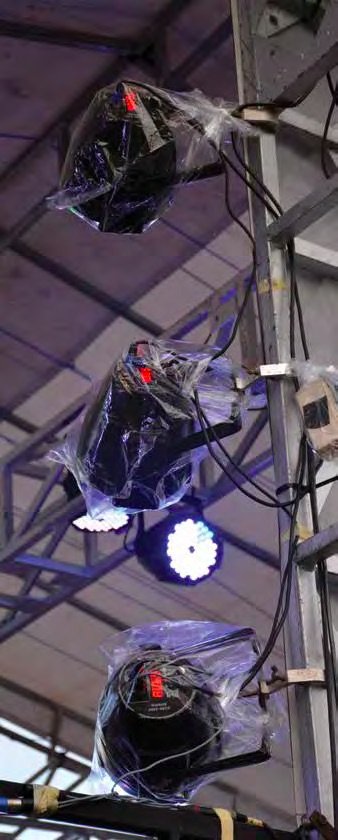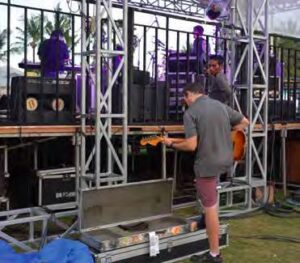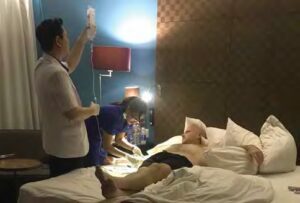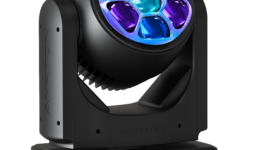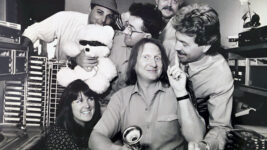Subscribe to CX E-News
FEATURE
Red Hot Summer Tour Goes to Bali
By Cat Strom.
Promoter Duane McDonald decided it was time to bring the successful Red Hot Summer touring concept to Bali and CX went along for the somewhat bumpy ride.
Since its inception eight years ago, the Red Hot Summer Tour phenomenon has grown to monster proportions. Touring the width and breadth of Australia for half the year, it’s a simple formula; jukebox hits taken to the people.
This year the RHST made its debut in Bali with the lineup of Aussie favourites Daryl Braithwaite, Shannon Noll, Ross Wilson, 1927, Pseudo Echo and Jason Singh. Held at Finns Recreation Club in Canggu, the concert was fraught with problems which was not entirely unexpected.
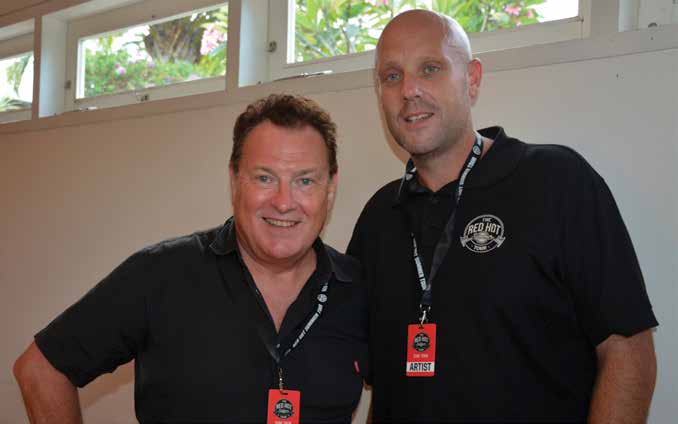
Ross Wilson with Duane McDonald
“I knew it wouldn’t make much money – in fact it has actually lost around $50,000 but that can be written off against the Australian shows,” said Duane McDonald, promoter of the RHST. “However, if it works and everyone is happy we’ll do it again. It was really targeting the expats but it hasn’t worked with that market. In the end we sold 1000 tickets so it’ll be OK.”
With ticket sales low leading up to the event, Duane could have cancelled the gig and saved money however he knew that punters had already purchased airfares and accommodation so, in his heart, he couldn’t do that.
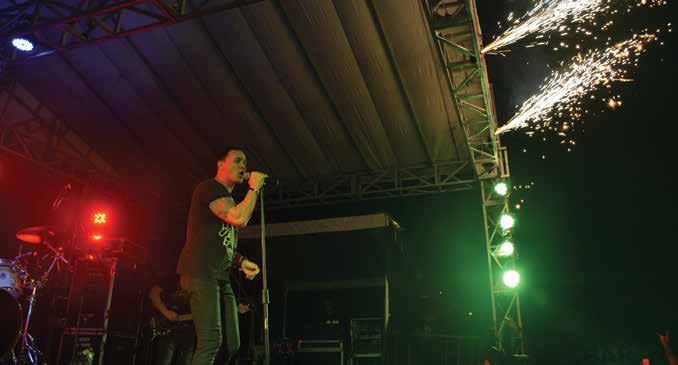
Shannon Noll
Duane seemed to take it all in his stride. He’s one of those easy-going, immediately likeable characters and it was evident that the crew and artists enjoyed working with him.
Only 24 hours before the main event, he was struck down with a severe case of Bali belly and had to be pumped full of drugs and rehydrated with a drip to the lets-rip-off-the-Aussie cost of $1000. The concern for his welfare on the day was evident and somehow he managed to get through.
Rewind 12 years and Duane was the proprietor of a hotel in regional Victoria when he received a cold call from Premier Artists about the possibility of Diesel playing at the hotel. That was followed by The Screaming Jets, then Jimmy Barnes, and so Duane got hooked on promoting. Well over 100 Jimmy Barnes shows later, he is still just as enthusiastic.
“The early days of RHST were really tough and a bit of a learning curve,” explained Duane. “Eight years ago Jimmy Barnes released his Red Hot album and he came up with the idea of finding six small regional towns to do shows promoting the album. And that’s where we got the idea to do the Red Hot Summer tour. Since then Jimmy has done four of the eight tours.”
Duane knows his market which tends to be your average middle-aged Aussie punter, dare I say veering on the bogan, and he contracts the bands to suit.“I love a lot of the new acts but this is a different demographic to the winery shows – we’re more Carlton Draught,” said Duane. “They’ve spent their $100 and basically they just want to relive their youth.”
Duane is conscious of the fact that his audience tends to be an older crowd and that some of the artists on stage are pushing 70. The tour often lives up to its name and Duane admits that the shows in 40 degree heat worry him. Keeping ageing punters and artists alive is just one of the challenges he faces every year.
“Getting acts to play where you think they should play on a bill is another challenge!” laughed Duane. “I like to roll the music and everyone has their own opinion, but ultimately it’s about the people buying the tickets.”
Most RHST shows are held on a Saturday, which is another key to its success. Gigs on a Sunday are not as popular with the punters. “There are only so many Saturdays in the time period, and towns get upset when they get a Sunday,” said Duane.
“The other challenge is traveling through the night for the next show (which is why Saturday shows tend to finish around 8.30pm) as we tour everything from food trucks to toilets. That way the setup is exactly the same at every show.”
Often it’s the small towns close to a big town that work the best, for example Jacob’s Well, which is 60 km from Brisbane, sells 12,000 tickets in a town of 1000 people. “There’s a town in South Australia called Mannum that sells out every year, it’s now in the South Australian Hall of Fame and it’s good to see the little towns get something out of the tour,” said Duane.
With the tour lasting 24 weeks, Duane has had to start splitting the acts into two different shows as it’s hard to ask an artist to tour for that long. Consequently this past summer had one run with John Farnham, Daryl Braithwaite, Baby Animals, The Black Sorrows with Vicka and Linda, and 1927, proceeded by an earlier run headed by Suzi Quatro, The Angels, Baby Animals, Moving Pictures, Chocolate Starfish and The Screaming Jets. Added to that were a few shows headlined by Icehouse.
“I’m slowly pulling it back in,” said Duane. “Next year there will be three tours again but the following year will be our 10th Anniversary and I’m aiming to go with the one main band and five supports.”
When Duane first started working with Jimmy Barnes, Powa Audio were already working with him and so Duane followed suit. “The first four or five years of the RHST was a case of just getting it over the line,” added Duane.
“We had big acts but people just weren’t comfortable with the concept at first. Powa were there from the start, they stepped up and built with it. When we could no longer use a trailer stage, they stepped up and built a ground support. Then they built a second one so we could leapfrog production. They used to carry an EV XLC PA system but a lot of riders weren’t friendly to that so they bought L-Acoustics K2 to keep everyone happy.
You have to stay loyal to companies like that. They’ve never let us down and we’ve put them through some horrible shows!”
- Powa’s Pat Kearny
- Powa’s Gabe Lauriola
- Stage Manager – Brett Millikin
- Brad Parker with Gabe Lauriola
However all that fancy, new-fangled technology had to be forgotten upon arrival in Bali! Two of Powa’s crew traveled to Bali so that ‘if it all went to s**t, they could make it work’. “The generator came in on the back of a motorbike,” laughed Duane. “The stage crew came in with bare feet and rather than drive the gear in, they carried it all on their shoulders. If we made them do that in Australia, we’d never hear the end of it!
“I worked in conjunction with the local production manager and supplier who pulled in all the bits from Bali,” said Pat. “It was a juggle as it was our first foray into Bali.
“Initially ticket sales were only 300 so we had to scale back on production to suit the budget, then as ticket sales picked up we juggled some more to get a bit more PA and some more lights. It was very much an unknown quantity especially as I had never been to Bali before.”
Fortunately Pat could seek advice from Dan Corless who runs Wick Studios in Melbourne as he has a property in Bali and has done several shows on the island. “He put me in touch with the right contacts and told me what to watch out for – especially ‘Bali Time’,” said Pat. “As a result we built a dead day into our schedule so when things didn’t arrive in time or work, we had time to sort everything. Yesterday we tested the backline and straightaway there were two amps that weren’t working and needed to be replaced.”
Logistical hurdles for the local suppliers included not being able to fit a large production in their small trucks. Everything, including staging and the truss, arrived in tiny trucks. With Bali’s notoriously bad traffic, the journey from the warehouse is a three-hour round-trip so getting the gear to the gig was a long process.
“At Powa we pay a lot of attention to detail on safety and there have been times when our due diligence has been put to the test and we’ve come out OK,” added Pat.
“Coming into Bali was a bit of a surprise for us! I still cast my eye over the structure to ensure it won’t fall down but there are finer details missing such as the way they connect things together with U-clamps and not scaff clamps. Things that make the engineering side of things difficult. In Australia, I can get an engineer to sign off on a structure but there’s nothing like that here!”
Pat approached the production with a very broad mind as to what would actually be delivered and he always had a backup plan. As to electrical safety, he had been told to expect some very scary things but was pleasantly surprised to find that the local guys had made an effort.
“There are no C-Form connectors, no 3-phase connectors – it’s all wired directly from the generator busbars into a distro with busbars on the distro. When the backup generator arrived, they wired in a crunch box but it’s literally just a contact crunch box, which I’ve been told they just switch over then and there with no syncronisation.
“That could result in all sorts of things happening so we put some procedural things in place so if we need to go to the backup generator, then we shut down, switch over and restart.”
PA choice was limited and if you wanted anything decent, it had to be flown in from Jakarta and with poor tickets sales that wasn’t an option. However the small German-made Nova Acoustic used actually sounded fine on the night partially due to Pat plotting it in Ease and preparing it well. Consoles were Midas Pro Series.
“Similarly with monitors, I chose a specific wedge that would do the job but when I got here instead of 12 there were eight with four of a different kind,” commented Pat. “By the day of the event it was eight of them, two of another and two more different ones! In Bali there are no large supply companies, it’s all pooled from a variety of small hire companies.”
The lighting was kept simple with just 24 LED Pars, a relief to Pat as it was less weight in the unrated roof and also less load on the generators. “There were no 100 or 150 kVA generators available and if I went with a 60 kVA then it was two little trucks that delivered them which was nice and easy logistically,” he said. “Basically it was a case of getting as good a look as we could but without going overboard.”
Pat remarked that the Balinese crew were very keen and helpful, even though there was the odd miscommunication, and he couldn’t fault how hard they worked. Powa are considering placing some of their older stock at Finns Recreation Club as the venue are keen to hold more events.
Earlier this year Ticketmaster awarded Duane with a trophy for being Australia’s biggest selling festival for the year and he was stoked.
“I’ve never even won a chook raffle but I thought ‘you know what, it’s worth it’,” he remarked. Whether Duane decides to bring the RHS to Bali again remains to be seen but he is keen to take it to New Zealand and maybe a winter run through TNQ.
- Duane on the eve of the concert
This article first appeared in the print edition of CX Magazine June 2018, pp.32-35. CX Magazine is Australia and New Zealand’s only publication dedicated to entertainment technology news and issues. Read all editions for free or search our archive www.cxnetwork.com.au
Subscribe
Published monthly since 1991, our famous AV industry magazine is free for download or pay for print. Subscribers also receive CX News, our free weekly email with the latest industry news and jobs.


